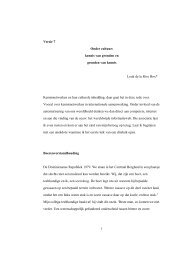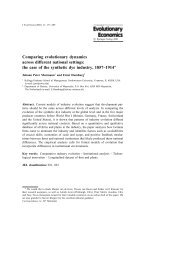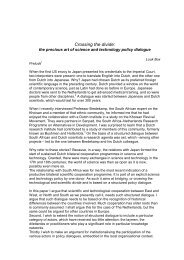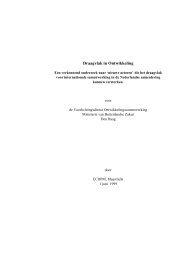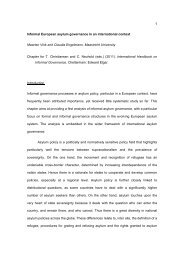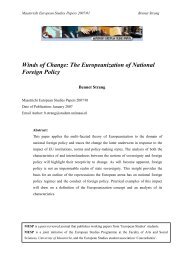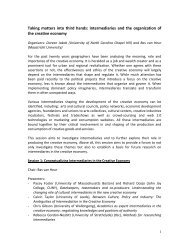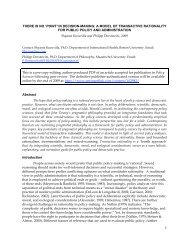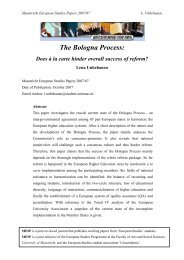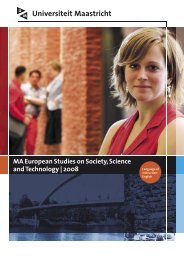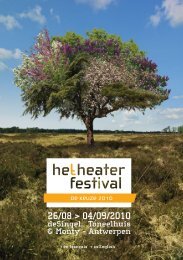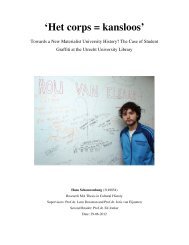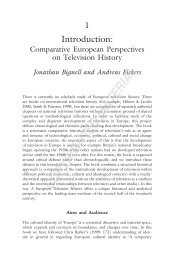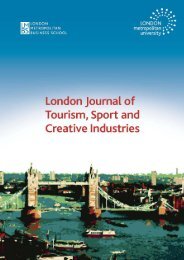Wiebe E. Bijker Curriculum Vitae and publication lists - Maastricht ...
Wiebe E. Bijker Curriculum Vitae and publication lists - Maastricht ...
Wiebe E. Bijker Curriculum Vitae and publication lists - Maastricht ...
Create successful ePaper yourself
Turn your PDF publications into a flip-book with our unique Google optimized e-Paper software.
<strong>Wiebe</strong> E. <strong>Bijker</strong><br />
<strong>Curriculum</strong> <strong>Vitae</strong> <strong>and</strong> <strong>publication</strong> <strong>lists</strong><br />
December 2012<br />
Summary 3<br />
Personal details <strong>and</strong> addresses 5<br />
Education 5<br />
Affiliations 5<br />
Awards 5<br />
Academic <strong>and</strong> professional functions 6<br />
Professional functions (international) 6<br />
Professional functions (the Netherl<strong>and</strong>s) 6<br />
Editorial committees 6<br />
Evaluation <strong>and</strong> assessment 7<br />
Scientific advice <strong>and</strong> peer-‐review 7<br />
Membership of professional organisations 8<br />
Visiting researcher <strong>and</strong> professor 8<br />
Postdoctoral fellows received 8<br />
Contract research 9<br />
Graduate teaching: management, supervision <strong>and</strong> examination 9<br />
Coordinating functions 9<br />
PhD-‐supervision 10<br />
PhD Examiner 11<br />
MSc, MA, <strong>and</strong> MPhil examination boards 12<br />
Undergraduate teaching 12<br />
Science <strong>and</strong> culture studies, <strong>Maastricht</strong> University (since 1990) 12<br />
Medical School, <strong>Maastricht</strong> University (1988 – 1999) 12<br />
Ten key <strong>publication</strong>s 13<br />
Complete list of <strong>publication</strong>s 14<br />
Journal articles 14<br />
in refereed journals 14<br />
in other journals 15<br />
Books 15<br />
Monographs <strong>and</strong> edited volumes 15<br />
Book chapters 15<br />
Conference proceedings 17<br />
Professional <strong>publication</strong>s <strong>and</strong> other products 17<br />
Professional <strong>publication</strong>s 17<br />
Reports 18<br />
Books <strong>and</strong> articles related to physics teaching 18<br />
1
Summary 1<br />
<strong>Wiebe</strong> E. <strong>Bijker</strong> (1951) was educated as an engineer (physics) at Delft University of Technology, then<br />
studied philosophy of science at the Universities of Amsterdam <strong>and</strong> Groningen, <strong>and</strong> received a PhD in<br />
the history <strong>and</strong> sociology of technology from Twente University.<br />
<strong>Bijker</strong>’s teaching <strong>and</strong> research focus on the relations between science, technology <strong>and</strong> society,<br />
encompassing the full spectrum from fundamental theoretical <strong>and</strong> empirical research to applied <strong>and</strong><br />
policy-related projects. His work straddles the natural, social <strong>and</strong> humanistic sciences.<br />
Partly parallel to his physics <strong>and</strong> philosophy education he taught physics in secondary school <strong>and</strong><br />
co-authored a series of Dutch science textbooks for secondary school that combined physics, chemistry<br />
<strong>and</strong> biology. He was active in the ‘science, technology <strong>and</strong> society’ (STS) movement, <strong>and</strong> helped to<br />
translate STS insights into secondary school science teaching. This interest in teaching continued, as<br />
witnessed by <strong>Bijker</strong>’s central role in designing the teaching programme of the Netherl<strong>and</strong>s Graduate<br />
School of Science, Technology <strong>and</strong> Modern Culture (WTMC), in establishing the European Association<br />
on Society, Science <strong>and</strong> Technology (with its European MA programme ESST), in developing <strong>and</strong><br />
teaching a separate line of history, philosophy <strong>and</strong> sociology of science in <strong>Maastricht</strong> University’s<br />
medical school, <strong>and</strong> in creating <strong>and</strong> directing the NVAO-accredited research master Cultures of Arts,<br />
Science <strong>and</strong> Technology (CAST). He has always continued some undergraduate teaching activities <strong>and</strong><br />
responsibilities.<br />
<strong>Bijker</strong> held a variety of administrative offices in <strong>Maastricht</strong> University, nationally, <strong>and</strong><br />
internationally. He was Dean of the Faculty of Arts <strong>and</strong> Social Sciences (1996 – 2000) <strong>and</strong> he<br />
established the KNAW-<strong>Maastricht</strong> Virtual Knowledge Studio in 2007. Nationally he played key roles in<br />
the graduate school WTMC. Internationally his Presidency of the Society for Social Studies of Science<br />
<strong>and</strong> various roles in the Society for the History of Technology st<strong>and</strong> out.<br />
<strong>Bijker</strong>’s research took off from his interest in the relations between science, technology <strong>and</strong> society<br />
that already guided his studies in Delft <strong>and</strong> his involvement in secondary school science education. He<br />
used historical case studies (aluminium, bicycle, Bakelite, Sulzer weaving machine, transistor) to ask<br />
sociological questions about technology development. <strong>Bijker</strong> formulated in 1983 the ‘social construction<br />
of technology’ (SCOT) heuristics <strong>and</strong> theory [4]. 2 Joining forces with sociologists of science <strong>and</strong><br />
historians of technology, this led to the 1987 volume The Social Construction of Technological Systems<br />
that came to be considered the beginning of ‘the new sociology of technology’ [1]. In the 1990’s he<br />
broadened both the research agenda <strong>and</strong> the theoretical <strong>and</strong> empirical scope of technology studies [2].<br />
The research questions were broadened to also address normative <strong>and</strong> political issues of technology,<br />
science <strong>and</strong> society. Theoretically this required new conceptions of technological culture, power,<br />
democracy, <strong>and</strong> vulnerability. New strategic research sites for his empirical studies included health <strong>and</strong><br />
medicine, town planning <strong>and</strong> architecture [3], gender <strong>and</strong> technology [5], sound studies, coastal<br />
engineering, <strong>and</strong> development studies. The successful demonstration by constructivist science <strong>and</strong><br />
technology studies that knowledge <strong>and</strong> technology can be understood as social processes could<br />
easily—though erroneously!— lead to the conclusion that anything goes <strong>and</strong> that there is nothing<br />
special about scientific knowledge or technical expertise. A detailed analysis of the inner workings of the<br />
Health Council of the Netherl<strong>and</strong>s serves as an antidote to this misreading <strong>and</strong> gives a new<br />
conceptualization of the role of scientific expertise in modern societies [9].<br />
An important effect of the broadening of the research programme—<strong>and</strong> one in which new<br />
connections between research <strong>and</strong> teaching are emerging—is the engagement of technology studies<br />
with other scholarly disciplines (such as economics, political sciences [7], philosophy), <strong>and</strong> with<br />
practitioners (such as engineers <strong>and</strong> scientists), policy makers, <strong>and</strong> civil society groups. For his advisory<br />
work <strong>Bijker</strong> actively draws on his triple background in physics, philosophy, <strong>and</strong> history & sociology of<br />
technology. Especially in his chairing advisory committees of the Health Council of the Netherl<strong>and</strong>s he is<br />
thus able to build bridges between the natural sciences <strong>and</strong> the humanities <strong>and</strong> social sciences.<br />
Recently granted EU projects aim deliberately at forging cooperation between the natural <strong>and</strong> social<br />
sciences.<br />
In his Presidential Address to the Society for Social Studies of Science <strong>Bijker</strong> argued in 2001 for a<br />
new role of STS researchers as public intellectuals [6]. Following the events of ‘9/11’ he helped to<br />
formulate new ways for science <strong>and</strong> technology studies of engaging with questions of security, risk <strong>and</strong><br />
vulnerability [10] <strong>and</strong> with issues of development in the global south [8]. This led to <strong>Bijker</strong>’s involvement<br />
in the formulation of new research programmes for NSF/ESF <strong>and</strong> the building up of a new research line<br />
in his research group in <strong>Maastricht</strong>. This engagement between academic work <strong>and</strong> the practices of<br />
science <strong>and</strong> technology for development is supported by his role as co-founder of the Knowledge in Civil<br />
Society Forum (KICS, Hyderabad, India), as scientific adviser to the African Technology Policy Studies<br />
network (ATPS), <strong>and</strong> by various EU-FP7 projects (e.g. SET-DEV <strong>and</strong> BESSE). A new NWO-WOTRO<br />
project (2009-2014) on nanotechnologies for development serves as new focal point for the previous<br />
research lines.<br />
In 2006 <strong>Bijker</strong> received the John Desmond Bernal Prize, awarded jointly by the Society for<br />
Social Studies of Science <strong>and</strong> the Thomson Scientific, for his distinguished contribution to the field of<br />
1 With embedded hyperlinks to various external sources.<br />
2 Bracketed numbers refer to the key <strong>publication</strong>s, see below<br />
3
science <strong>and</strong> technology studies. In 2009 <strong>Bijker</strong> became Officier in de Orde van Oranje Nassau. In 2012<br />
he was awarded the Leonardo da Vinci Medal by the Society for the History of Technology for his<br />
“outst<strong>and</strong>ing contribution to the history of technology, through research, teaching, <strong>publication</strong>s, <strong>and</strong><br />
other activities.”<br />
4
Personal details <strong>and</strong> addresses<br />
Born: 19 March 1951 in Delft, The Netherl<strong>and</strong>s<br />
Marital status: married, three children<br />
Nationality: Dutch<br />
Languages: Dutch (native), English (fluent)<br />
German, French (reasonable)<br />
Home Address Work Address<br />
Van Beethovenstraat 11,<br />
6245 GK Eijsden<br />
T: +31-43-4091006<br />
Education<br />
<strong>Maastricht</strong> University,<br />
Faculty of Arts & Social Sciences,<br />
Department of Technology & Society Studies<br />
Postal address<br />
PO Box 616, 6200 MD <strong>Maastricht</strong><br />
Visiting address<br />
Grote Gracht 80-82<br />
<strong>Maastricht</strong><br />
T: +31 43 388 3321<br />
F: +31 43 388 4917<br />
W.<strong>Bijker</strong>@maastrichtuniversity.NL<br />
http://www.fdcw.unimaas.nl/staff/<strong>Bijker</strong><br />
University of Twente, PhD, History <strong>and</strong> Sociology of Technology, 1990: The Social Construction of Technology<br />
(supervisors: Prof.dr. Peter Boskma (†) <strong>and</strong> Prof.dr. Arie Rip)<br />
Delft University of Technology, MSc <strong>and</strong> Engineering, Physics, 1976<br />
Universiteit van Amsterdam, BA, Philosophy, 1974<br />
Gymnasium ß, Emmeloord, 1969<br />
Affiliations<br />
<strong>Maastricht</strong> University (formerly Rijksuniversiteit Limburg):<br />
• Professor of Technology & Society (since 1994)<br />
• Co-director (with Sally Wyatt) of the <strong>Maastricht</strong> Virtual Knowledge Studio (UM-KNAW; since 2007)<br />
• Chair of the Department of Technology & Society Studies, Faculty of Arts & Social Sciences (since 1995)<br />
• Research Leader STS Research Programme, Faculty of Arts & Social Sciences (since 1990)<br />
• Dean Faculty of Arts & Social Sciences (then: Faculteit der Cultuurwetenschappen; 1996 – 2000)<br />
• Director Research Institute CWS, Universiteit <strong>Maastricht</strong> (1994 – 1996)<br />
• Associate professor of philosophy (1990 – 1994)<br />
• Research Leader of the programme "Technology Assessment", MERIT, <strong>Maastricht</strong> (1988 – 1992)<br />
• Assistant professor of philosophy (1987 – 1990)<br />
Netherl<strong>and</strong>s Organisation for Scientific Research (NWO, formerly ZWO): researcher in project "De sociale constructie<br />
van technische artefacten: een theoretisch onderzoek naar techniekontwikkeling" (1985 – 1988)<br />
University of Twente: researcher, history <strong>and</strong> sociology of technology (1980 – 1985)<br />
Meulenhoff Educatief, Amsterdam: physics text books author Exact (1978 – 1984)<br />
Utrecht University, Project Leerpakket Ontwikkeling Natuurkunde (PLON): researcher, project curriculum<br />
development (1979 – 1981)<br />
Openbare scholengemeenschap Van Oldenbarnevelt, Rotterdam: physics teacher (1974 – 1980)<br />
Awards<br />
Leonardo da Vinci Medal 2012, awarded by the Society for the History of Technology for his “outst<strong>and</strong>ing contribution<br />
to the history of technology, through research, teaching, <strong>publication</strong>s, <strong>and</strong> other activities.”<br />
Officier in de Orde van Oranje Nassau, 29 th May 2009<br />
John Desmond Bernal Prize 2006, awarded jointly by the Society for Social Studies of Science <strong>and</strong> the Thomson<br />
Scientific, for ”distinguished contribution to the field”<br />
Abbot Payson Usher Prize 2002, awarded “for the best scholarly work published during the preceding three years<br />
under the auspices of the Society for the History of Technology, for “Women Walking through Plans. Technology,<br />
Democracy, <strong>and</strong> Gender Identity”, Technology & Culture, 41 (2000): 485-515 (with Karin Bijsterveld)<br />
Edmond Hustinx Prijs voor de Wetenschap 1991, awarded for the dissertation The social construction of technology<br />
(1990)<br />
5
World-Didac Golden Award 1986, awarded for the textbook series Exact (1982 – 1984)<br />
Academic <strong>and</strong> professional functions<br />
Professional functions (international)<br />
Founding editor of "INSIDE TECHNOLOGY. A Monograph Series in the Social <strong>and</strong> Historical Studies of Technology",<br />
MIT Press: Cambridge, Ma. (with W.B.Carlson en T.J.Pinch, since 1987)<br />
Founding editor of “Science <strong>and</strong> Democracy in South Asia”. Orient Blackswan, Hyderabad, India (with Shiv<br />
Visvanathan)<br />
Distinguished Fellow at the SARChI Development Education (Prof. Catherine Hoppers), University of South Africa,<br />
Pretoria (since 2012)<br />
Member advisory panel PACITA (Parliaments <strong>and</strong> Civil Society in Technology Assessment) (2011-2015)<br />
Society for Social Studies of Science:<br />
• Chair of the special committee on 4S Governance (2012-2013)<br />
• Co-organiser of “Past, Present, <strong>and</strong> Future of Research in the Information Society”, satellite conference of<br />
the World Summit on the Information Society, Tunis (2005)<br />
• President (2001 – 2003)<br />
• Member Nominations Committee (1990 – 1994)<br />
• Chair Students Activities Committee (1988 – 1992)<br />
• Chair Nicholas Mullins Award Jury (1988 – 1992)<br />
• Member Council (1988 – 1991)<br />
• Member Publications Committee (1988 – 1991)<br />
Society for the History of Technology:<br />
• Member Publications Committee (2008 – 2013)<br />
• Member Executive Council, (2004 – 2007)<br />
• Member Committee on International Fellows (1990 – 1991)<br />
EU Network of Excellence PRIME (Policies for Research <strong>and</strong> Innovation in the Move towards the European<br />
Research Area):<br />
• Member Executive Committee (2005 – 2008)<br />
• Member Scientific Committee (2004 – 2005)<br />
Society for the Philosophy of Technology:<br />
• Member Programme Committee Delft Conference (2005)<br />
Other:<br />
• Member International Scientific Committee of the First International Conference On Coastal Zone<br />
Management of River Deltas <strong>and</strong> Low L<strong>and</strong> Coastlines (Alex<strong>and</strong>ria, Egypt, 2010)<br />
Professional functions (the Netherl<strong>and</strong>s)<br />
Member Board Rathenau Institute (2010-2014)<br />
Member Health Council of the Netherl<strong>and</strong>s (2008-2016)<br />
Member Scientific Advisory Board of EcoShape, Building with Nature (since 2008)<br />
Vice-chair governmental “Commissie maatschappelijke dialoog nanotechnologie” (Committee Societal Dialogue<br />
Nanotechnologies) (2009-2011)<br />
Member International Advisory Board of the KNAW Virtual Knowledge Studio (2006-2011)<br />
Member Steering Group “Technologie en Religie”, Stichting Toekomstbeeld der Techniek (2005 – 2008)<br />
Member Advisory Board of UNU-Merit, <strong>Maastricht</strong> (since 2006)<br />
Member Board <strong>Maastricht</strong> Economic Research Institute on Technology, MERIT, Universiteit <strong>Maastricht</strong> (1995 –<br />
2006)<br />
Member Steering Group “Het Nieuwe Bewonen”, Stichting Toekomstbeeld der Techniek (2002 – 2004)<br />
Chair of the board of Intro | In Situ, Atelier for sound art <strong>and</strong> modern music, <strong>Maastricht</strong> (since 2001)<br />
Fellow International Institute of Infonomics, <strong>Maastricht</strong> (2000 – 2005)<br />
Founding Board member <strong>Maastricht</strong> McLuhan Institute for European Digital Culture (1998 – 2000)<br />
Founding co-editor Jaarboek voor de Geschiedenis van Bedrijf en Techniek (1984 – 1992)<br />
Chair Eurometrics Committee Nederl<strong>and</strong> (1988 – 1991)<br />
Coordinator Netherl<strong>and</strong>s Workshop Science in Context (1984 – 1989)<br />
Editorial committees<br />
Journal of Research Practice, Focus Editor ‘Research Spaces’ (since 2011)<br />
IEEE STARS Editorial Board (http://www.ieeeghn.org/wiki/index.php/Special:Home ) (2012-2014)<br />
East Asian Science, Technology <strong>and</strong> Society: an International Journal (Taiwan, Springer), Member Editorial Advisory<br />
Board (since 2007)<br />
Technology & Culture, member <strong>publication</strong> committee (2008-2013)<br />
NTM - Zeitschrift für Geschichte der Wissenschaften, Technik und Medizin (Germany, Birkhäuser), Member Editorial<br />
Advisory Board (since 2007)<br />
Science, Technology & Society (India, SAGE), Member Editorial Advisory Board (since 2006)<br />
Graduate Journal of Social Science (UK/NL, LSE/VU), Member Academic Advisory Board (since 2006)<br />
REDES - Revista Latinoamericana de estudios sociales de la ciencia y la tecnología (Argentina, Universidad<br />
Nacional de Quilmes), Member Editorial Advisory Committee (since 2003)<br />
6
Science, Technology & Human Values (US, SAGE), Member Editorial Advisory Board (since 1998)<br />
H<strong>and</strong>book for Science <strong>and</strong> Technology Studies (SAGE, 2007), Member Advisory Board<br />
International Encyclopedia of the Social <strong>and</strong> Behavioral Sciences (Pergamon-Elsevier; 2001), Member International<br />
Advisory Board<br />
H<strong>and</strong>book for Science <strong>and</strong> Technology Studies (SAGE, 1995), Member Editorial Advisory Committee<br />
Evaluation <strong>and</strong> assessment<br />
Chair of the external research assessment committee for the Mansholt Graduate School of Social Sciences <strong>and</strong> the<br />
CERES Research School for Resource Studies for Development, Wageningen University (2009)<br />
Chair of the external research assessment committee for the Institute for Science, Innovation & Society, Radboud<br />
University Nijmegen (2008)<br />
External expert on the evaluation committee of Catalan Universities (2001)<br />
Confidential advice on tenure <strong>and</strong> promotion in the Universities of: Trondheim, Denmark (Technical), Edinburgh,<br />
York, Cardiff, Oxford, Brunel, East-London, Sussex, Ecole des Mines, Lyon, Catalunia, MIT, Harvard, Cornell,<br />
Virginia, California, Oklahoma.<br />
Scientific advice <strong>and</strong> peer-review<br />
Chair Steering Group MFS II Evaluation, WOTRO-NWO (for Min. Foreign Affairs <strong>and</strong> PARTOS; 2011-2015)<br />
Chair Advisory Committee Dastkar Andhra, Hyderabad (since 2010)<br />
Member NWO advisory board Maatschappelik Verantwoord Innoveren (2012)<br />
Chair NWO domain panel Gamma in VIDI procedure (2011)<br />
Chair NWO advisory committee on interdisciplinary VICI (2011)<br />
Chair Professorial Profiling Committee (structuurcommissie) “Communication, Science, Technology <strong>and</strong> Ethics”<br />
Wageningen University & Research Centre (2011-2012)<br />
Chair Advisory Committee of the Health Council of the Netherl<strong>and</strong>s on Nanoparticles in the workplace (2010-2012)<br />
Chair NWO domain panel Gamma in VENI procedure (2010)<br />
Chair NWO advisory committee on interdisciplinary VENI (2009)<br />
Chair Subcommittee Societal Issues of the Taskforce Life Sciences (NWO-ALW, NWO-CW, STW, ZonMw, NGI) en<br />
SenterNovem to produce a Life Science Vision for the Prime Minister’s Innovation Platform (2009)<br />
Chair joint Advisory Committee of the Health Council of the Netherl<strong>and</strong>s (GR), the Committee on Genetic<br />
Modification (COGEM) <strong>and</strong> the Committee on Animal Biotechnology (CBD) on trends in biotechnology (2008 –<br />
2009)<br />
Scientific Expert on new research themes for Science in Society in the EU 7th Framework Programme to Directorate<br />
L (Science, Economy <strong>and</strong> Society), DG-RTD, EC (Genoa, 2008)<br />
Adviser on a Code of Conduct on nanotechnologies to the Unit of Governance <strong>and</strong> Ethics, DG-RTD, EC (Brussels,<br />
2007)<br />
Adviser on the renewed Sustainable Development Programme to Directorate I (Environment), DG-RTD, EC<br />
(Brussels, 2007)<br />
Adviser on risk governance <strong>and</strong> nanotechnologies to the Irish Council for Bioethics (Dublin, 2007)<br />
Associate member of the Advisory Committee on the Open Call for Humanities, Netherl<strong>and</strong>s Organisation for<br />
Scientific Research (NWO; 2006 – 2008)<br />
Member joint Advisory Committee of the Health Council of the Netherl<strong>and</strong>s (GR), the Committee on Genetic<br />
Modification (COGEM) <strong>and</strong> the Committee on Animal Biotechnology (CBD) on trends in biotechnology (2005 –<br />
2007)<br />
Member Advisory Committee of the Health Council of the Netherl<strong>and</strong>s on the Precautionary Principle (2004 – 2008)<br />
Chair Advisory Committee of the Health Council of the Netherl<strong>and</strong>s on Risks <strong>and</strong> Benefits of Nanotechnologies (2004<br />
– 2006)<br />
Member of the Royal Academy of Sciences of the Netherl<strong>and</strong>s (KNAW) committee to select proposals for an<br />
International Research Institute on e-Science Studies in the Humanities <strong>and</strong> Social Sciences (Amsterdam, 2004);<br />
this developed into the KNAW Virtual Knowledge Studio (VKS)<br />
Consultant to CRIEPI (http://criepi.denken.or.jp/en/index.html ) for the project “Social Decision Making Process for<br />
Energy Technology Introduction”, Tokyo, 2003 – 2005 .<br />
Chair of the KNAW committee to investigate <strong>and</strong> design an International Research Institute on e-Science Studies in<br />
the Humanities <strong>and</strong> Social Sciences (Amsterdam, 2003)<br />
Member Strategic Committee NIWI, KNAW (Amsterdam, 2002)<br />
Chair of the Exploration Committee on the Role of the Humanities in the Information Society, Advisory Council on<br />
Science Policy (AWT), 2000 – 2001<br />
Member Advisory Committee on Economic, Social <strong>and</strong> Geographical Sciences, Netherl<strong>and</strong>s Organisation for<br />
Scientific Research (NWO; 1998 – 2001)<br />
Adviser to the Norwegian Research Council, Programme on ICT <strong>and</strong> Culture, Oslo, 1997<br />
Adviser on the Strategic research plan Faculty of Humanities, University of Trondheim, Trondheim, 1997<br />
"STS Research in European Countries", advice to COST-network, Finl<strong>and</strong>, 1994<br />
"Mechatronica", rondetafelgesprek, gepubliceerd in Metaal en Technologie, nr.6, bijlage bij Metaal en Techniek, 38,<br />
October 1993.<br />
"Possibilities for Future Swedish Research in the History of Technology", advice to the Research Committee of the<br />
National Museum of Science <strong>and</strong> Technology, Stockholm, 1988<br />
"From the New Technology Studies to a Philosophical Engineer: through a research program for the Division of<br />
Humanities toward a minor <strong>and</strong> a major degree", advice to the Dean, School of Engineering <strong>and</strong> Applied Science,<br />
University of Virginia, Charlottesville, VA, USA,1987<br />
Anonymous referee for the following journals, funding agencies, <strong>and</strong> academic publishers:<br />
7
Journals Funding institutions Book publishers<br />
Electronic Journal of Sociology (EJS;<br />
http://www.sociology.org )<br />
Graduate Journal of Social Science<br />
History <strong>and</strong> Philosophy of the Life<br />
Sciences<br />
History <strong>and</strong> Technology<br />
Journal for Peace Research<br />
Research Policy<br />
Science, Technology & Human Values<br />
Social Studies of Science<br />
Technology <strong>and</strong> Culture<br />
The Sociological Review<br />
Membership of professional organisations<br />
Academy of Finl<strong>and</strong><br />
Conseil de recherches en sciences<br />
humaines du Canada<br />
Economic & Social Research Council<br />
(ESRC), UK<br />
The John D. <strong>and</strong> Catherine T. MacArthur<br />
Foundation (USA)<br />
Leverhulme Trust, UK<br />
National Science Foundation, U.S.A.<br />
Nuffield Foundation, UK<br />
Norwegian Research Council<br />
NWO, sections Humanities <strong>and</strong> Social <strong>and</strong><br />
Behavioral Sciences, Development<br />
Sciences, NL<br />
NWO, Stichting voor Filosofie en Theologie,<br />
NL<br />
NWO, Stichting voor Historische<br />
Wetenschappen, NL<br />
NWO, Stichting Wijsgerig Onderzoek<br />
Nederl<strong>and</strong>, NL<br />
Slovenian Research Council<br />
Vetenskapsrådet, The Swedish Research<br />
Council<br />
Cambridge University Press<br />
Duke University Press<br />
MIT Press<br />
Routledge<br />
Routledge & Kegan Paul<br />
SAGE Publications<br />
Westview Press<br />
Society for Social Studies of Science (4S)<br />
Society for the History of Technology (SHOT)<br />
European Association for the Study of Science <strong>and</strong> Technology (EASST)<br />
Genootschap voor de Geschiedenis der Geneeskunde, Wiskunde, Natuurwetenschappen en Techniek (GeWiNa)<br />
Studievereniging voor Sociaal-Ekonomische Geschiedenis<br />
Vereniging het Nederl<strong>and</strong>s Ekonomisch-Historisch Archief<br />
Nederl<strong>and</strong>s Vereniging voor Wetenschapsfilosofie (until 2005)<br />
ZWO Werkgemeenschap Wetenschapsonderzoek (until its dissolution)<br />
ZWO Werkgemeenschap Wetenschapsfilosofie (until its dissolution)<br />
L<strong>and</strong>elijke Workshop Wetenschap in Context (until its dissolution)<br />
L<strong>and</strong>elijke Werkgroep Techniekgeschiedenis (until its dissolution)<br />
Vereniging P<strong>and</strong>ore, Parijs (until its dissolution)<br />
Nederl<strong>and</strong>s Vereniging voor Onderwijs in de Natuurwetenschappen (until 1984)<br />
Visiting researcher <strong>and</strong> professor<br />
(part-time)<br />
Visiting researcher: NSF Technology Ethics project, University of Virginia, Charlottesville, VA, 2005<br />
Visiting professor ESST Oslo, 1993-1996; Lausanne, 1994-1996; Namur, 1994-1996; Madrid, 1995<br />
Professor Summer University: Donostian Udako Ikastaroak, Euskal Herriko Unibertsitatea, Donostia, San Sebastian,<br />
1993.<br />
Visiting professor: STS Doctoral Programme in Technology Policy <strong>and</strong> Social Development, Roskilde University<br />
Center, October 1992.<br />
Visiting professor: Technology Assessment, Technical University of Denmark, Lyngby, 1992<br />
Visiting professor: Technische Universität Wien, Institut für Technik und Gesellschaft, Vienna, 1990-1991<br />
Visiting researcher: Norwegian Research Council for the Humanities, Oslo, 1990<br />
Visiting researcher: Technology Assessment, Technical University of Denmark, Lyngby, 1990<br />
Invited lectures <strong>and</strong> seminars in the Universities of Trondheim, Oslo, Linköping, Stockholm, Lyngby (TU),<br />
Kopenhagen, Roskilde, Aalborg, Edinburgh, York, Dublin, Oxford, Cardiff, Bath, Sussex, London (University<br />
College, Kings College), Gent, Louvain-la-Neuve, Namur, Liège, Berlin (Wissenschatszentrum), Halle (Max<br />
Planck Inst.), Bielefeld, Köln (Max Planck Inst.), Aachen, Darmstadt, Essen, Paris (Ecole des Mines, CNSR),<br />
Lausanne, Zürich, Genova, Roma, Barcelona, San Sebastian, Madrid, Salamanca, Dubrovnik (Eur. Univ. Centr.),<br />
Athens (TU), Istanbul (TU), Delhi, G<strong>and</strong>hinagar, Ahmedabad (NID), Hyderabad (CHU), Bhubaneswar (XIM),<br />
Taipeh, Tokyo, California (USB), Stanford, Vancouver, Denver, Illinois, Virginia (in Charlottesville, VA),<br />
Pennsylvania (in Philadelphia, PA), MIT, Harvard.<br />
Postdoctoral fellows received<br />
Dr. Aalok Kh<strong>and</strong>ekar (Indian), 2011-2014<br />
Dr. Eduard Aibar (Spanish), January 1995 – December 1995, currently Vice-Rector of Research, Universitat Oberta<br />
de Catalunya<br />
8
Dr. Esha Shah (Indian), February 2006 – April 2006, currently Research Fellow “Knowledge, Technology <strong>and</strong><br />
Society” at IDS, University of Sussex<br />
Dr. Laxmi Thummuru (Indian), March 2006 – May 2006, currently assistant professor at Tata Institute of Social<br />
Sciences, Mumbai<br />
Dr. Ragna Zeiss (Dutch), March 2007 – March 2008, currently assistant professor at <strong>Maastricht</strong> University, Faculty of<br />
Arts <strong>and</strong> Social Sciences<br />
Dr. Ruth Benschop (Dutch), August 2004 – November 2008, <strong>and</strong> then part-time lecturer at <strong>Maastricht</strong> University,<br />
Faculty of Arts <strong>and</strong> Social Sciences <strong>and</strong> part-time associate lector Arts Studies Hogeschool Zuyd<br />
Contract research<br />
“How States Account for Failure in Europe: Risk <strong>and</strong> the Limits of Governance—HowSAFE”, A multilateral research<br />
project under the Open Research Area (ESRC, DFG, ANR, <strong>and</strong> NWO), with Frederic Bouder, 2012-2015<br />
“Negotiating Local <strong>and</strong> Global Requirements in Biomedical Research: The Case of Biobanking — Globloc Biobanks”,<br />
Marie Curie Outgoing Fellowship for Dr. Erik Aarden to Harvard University, 2011-2015<br />
“Managing Dutch Water Safety Vulnerabilities A social cultural perspective on the threats of flooding”, NWO<br />
Humanities substitution grant, 2010-2011<br />
“Nanotechnologies for development in India, Kenya <strong>and</strong> The Netherl<strong>and</strong>s—Towards a framework for democratic<br />
governance of risks in developing countries”, NWO-WOTRO Integrated Programme, 2009 – 2013<br />
“Brokering Environmentally Sustainable Sanitation for Europe” (BESSE), Collaborative project Framework VII,<br />
European Union, 2009 – 2012 (Coordinator)<br />
“Soundscapes of the Urban Past”, Postdoc + PhD projects, NWO Cultural Dynamics, 2008 – 2013 (with Prof.dr. Karin<br />
Bijsterveld)<br />
“Science, Ethics <strong>and</strong> Technological Responsibility in Developing <strong>and</strong> Emerging Countries” (SET-DEV), Coordination<br />
<strong>and</strong> Support Action Framework VII, European Union, 2008 – 2011<br />
“Selling Sound”, Postdoc + PhD projects, NWO Open Competition, 2007 – 2011 (with Prof.dr. Karin Bijsterveld)<br />
“Social Sciences <strong>and</strong> European Research Capacities” (SS-ERC), Specific Targeted Research Project Framework VI,<br />
European Union, 2006 – 2009<br />
“Second external review of NWO-WOTRO’s Programme of Action, Research for Development (2002-2006)”,<br />
Ministerie van Buitenl<strong>and</strong>se Zaken, DGIS, 2006 – 2007<br />
“Omgevingsanalyse van het Centrum voor Ethiek en Gezondheid (CEG)”, Ministerie van Volksgezondheid, Welzijn<br />
en Sport (VWS), 2006 – 2007<br />
“Sound Technologies & Cultural Practices” Postdoc + PhD project in NWO Cultural Transformations Programme,<br />
2004 – 2008 (with Prof.dr. José van Dijck, University of Amsterdam)<br />
“Ultrasound in Ghana <strong>and</strong> Tanzania. The politics of a medical technology in other cultural contexts”, PhD project,<br />
NWO-WOTRO, 2001-2005<br />
“Trajecten van advisering. Over de impact van adviezen van de Gezondheidsraad”, Netherl<strong>and</strong>s Health Council,<br />
2000 – 2002<br />
“Research <strong>and</strong> Technology for Development (RTD): support to the ACP-EU policy dialogue”, EU DG Development<br />
<strong>and</strong> Netherl<strong>and</strong>s Ministry for Foreign Affairs, DGIS-DCO/OZ, 2000 – 2001<br />
“PROcedure To Evaluate <strong>and</strong> monitor innovations as collective Experiments” (PROTEE), DG VII, European Union,<br />
1998–1998 (with Bruno Latour <strong>and</strong> Steve Woolgar)<br />
"Social Learning in Multi Media", TSER project Framework IV, European Union, 1996 – 1999<br />
"Electra Evaluation <strong>and</strong> Dissemination", Electra Project ALMA Universities, Provincie Limburg en EU INTERREG-<br />
Programma,1996 – 1998<br />
“Public debate 'Natuurontwikkeling: Waarom en Hoe?'", Rathenau Instituut, Platform Wetenschap en Ethiek, 1996<br />
"Cultura Tecnologica e Innovacion", pilot project for COTEC, 1995 (with Prof. Paloma Sanchez, Autonomous<br />
University of Madrid, <strong>and</strong> Prof. Miguel Angel Quintanilla, University of Salamanca)<br />
"Mijnen en Mijnwerkers / Mines et Mineurs", Provincie Limburg en EU INTERREG-Programma, 1993 – 1996<br />
"Underst<strong>and</strong>ing the Politics of Technology. A Comparative International Study of Technological Controversies <strong>and</strong><br />
Technology Acceptance", Büro Technikfolgen-Abschätzung beim Deutschen Bundestag, 1993 – 1994<br />
Graduate teaching: management, supervision <strong>and</strong> examination<br />
Coordinating functions<br />
Research master Cultures of Arts, Science <strong>and</strong> Technology (CAST, NVAO accredited), MPhil (since 2005):<br />
• Director of studies<br />
• Chair selection committee<br />
• Mentor <strong>and</strong> coach of students<br />
• Coordinator thesis colloquium<br />
• Coordination research internships<br />
• Supervision some internships<br />
• Supervision some theses<br />
• Lectures <strong>and</strong> skills trainings in various courses<br />
Netherl<strong>and</strong>s Graduate School on Science, Technology <strong>and</strong> Modern Culture (WTMC), PhD:<br />
• Chairman of the Board (2000 – 2004)<br />
• Scientific Director (1997 – 1999)<br />
• Member of the Board (1987 – 1997)<br />
• Coordinator (1987 – 1990)<br />
European Inter-university Association on Society, Science <strong>and</strong> Technology (ESST), MA:<br />
• Secretary Executive Council (1996 – 1997)<br />
9
• Member of the Administrative Board (1991 – 1997)<br />
• Co-founder <strong>and</strong> first International Scientific Coordinator of the ESST master's programme (1991 – 1996)<br />
Dutch member of the steering committee of the European Network for Collaboration of Post-Graduate Programs in<br />
Science, Technology <strong>and</strong> Society (1987 – 1990)<br />
PhD-supervision<br />
(with current affiliation of graduate)[with co-supervisor]<br />
Dirk de Wit (Dutch), The shaping of automation. A historical analysis of the interaction between technology <strong>and</strong><br />
organization. 1950-1985, April 1994, Rotterdam (currently: Director, Manager Advisory Group Public Sector, O&i<br />
Business Process Management Consultants, Utrecht) [with Prof.dr. Huib Vleesenbeek]<br />
Ger Wackers (Dutch), Constructivist Medicine, October 1994, <strong>Maastricht</strong> (currently: Associate Professor, Narvik<br />
University College, Norway) [with Prof.dr. Henk ten Have]<br />
Sally Wyatt (Canadian), Technology’s Arrow, October 1998, <strong>Maastricht</strong> (currently: Professor of Digital Cultures in<br />
Development, <strong>Maastricht</strong> University; <strong>and</strong> Senior Research Fellow, KNAW Virtual Knowledge Studio, Amsterdam)<br />
Agnes Meershoek (Dutch), Weer aan het werk. Verzekeringsgeneeskundige verzuimbegeleiding als onderh<strong>and</strong>eling<br />
over verantwoordelijkheden, June 1999, <strong>Maastricht</strong> (currently: assistant professor, Faculty of Health, Medicine<br />
<strong>and</strong> Life Sciences, <strong>Maastricht</strong> University) [with Dr. Guy Widdershoven en Prof.dr. Frans Nijhuis]<br />
Toine Pieters (Dutch), Biology Meets Drug Development: The Biography of a ‘Miracle ‘ Drug, the Interferons,<br />
November 1999, <strong>Maastricht</strong> (currently: Professor of History of Pharmacy, Utrecht University <strong>and</strong> Groningen<br />
University; <strong>and</strong> senior researcher <strong>and</strong> research leader Metamedica, Vrije Universiteit Amsterdam)<br />
Anique Hommels (Dutch), Unbuilding Cities – Obduracy in Urban Sociotechnical Change, September 2001,<br />
<strong>Maastricht</strong> (currently: assistant professor, Faculty of Arts <strong>and</strong> Social Sciences, <strong>Maastricht</strong> University) [with Dr.<br />
Karin Bijsterbeld]<br />
Jessica Mesman (Dutch). Ervaren pioniers. Omgaan met twijfel in de intensive care voor pasgeborenen, June 2002,<br />
<strong>Maastricht</strong> (currently: assistant professor, Faculty of Arts <strong>and</strong> Social Sciences, <strong>Maastricht</strong> University) [with<br />
Prof.dr. Rein de Wilde]<br />
Bernard Leupen (Dutch), Kader en generieke ruimte. Een onderzoek naar de ver<strong>and</strong>erbare woning op basis van het<br />
permanente, October 2002, Delft (currently: associate professor, Faculty of Architecture, University of<br />
Technology Delft) [with Prof.ir. M. Risselada]<br />
Ruth Mourik (Dutch), Did water kill the cows? The distribution <strong>and</strong> democratisation of risk, responsibility <strong>and</strong><br />
accountability in a Dutch agricultural controversy on water pollution <strong>and</strong> cattle sickness, December 2004,<br />
<strong>Maastricht</strong> (currently: Senior Researcher Energy Innovations <strong>and</strong> Society, Energy research Centre of the<br />
Netherl<strong>and</strong>s (ECN), Amsterdam)<br />
Babette Müller-Rockstroh (German), Ultrasound Travels: The Politics of a Medical Technology in Ghana <strong>and</strong><br />
Tanzania, June 2007, <strong>Maastricht</strong> (currently: researcher Max Planck Institute for Social Anthropology, Halle,<br />
Germany) [with Dr. Bernike Pasveer]<br />
Anne Wesselink (Dutch), Integraal waterbeheer: de verweving van expertise en belangen, October 2007, Enschede<br />
(currently: Marie Curie research fellow, Sustainability Research Institute, School of Earth <strong>and</strong> Environment,<br />
University of Leeds, UK) [with Prof.dr.ir. Huib de Vriend en Dr. Maarten Krol]<br />
Maaike Lauwaert (Belgium), The Place of Play. On Toys, Technological Innovations <strong>and</strong> Geographies of Play, March<br />
2008, <strong>Maastricht</strong> (currently: projectmedewerker beeldende kunst en vormgeving, Mondriaan Stichting,<br />
Amsterdam; <strong>and</strong> NWO-Rubicon fellow, <strong>Maastricht</strong> University & MIT, Cambridge, MA) [with Dr. Jo Wachelder]<br />
Susan van ‘t Klooster (Dutch), Toekomstverkenning: ambities en de praktijk, October 2008, <strong>Maastricht</strong> (currently:<br />
researcher, Instituut voor Milieuvraagstukken, Vrije Universiteit Amsterdam) [with Prof.dr.ir. Marjolein van Asselt]<br />
Niki Vermeulen (Dutch), Supersizing Science, On building large-scale research projects in biology, June 2009,<br />
<strong>Maastricht</strong> (currently postdoc University of Vienna) [with Prof.dr. Rein de Wilde]<br />
Polly C.A. van Hövell-Maclaine Pont (Dutch), Uncorking the bottle, the socio-technical construction of Argentine<br />
quality wine, Instituto de Estudios sobre la Ciencia y la Tecnología, Universidad Nacional de Quilmes, CONICET,<br />
Argentina, September 2009, Buenos Aires [with Prof.dr. Hernàn Thomas]<br />
Julia Quartz (German), “Constructing Agrarian Alternatives—How a creative dissent project engages with the<br />
vulnerable livelihood conditions of marginal farmers in South India.” April 2011, <strong>Maastricht</strong> [with Dr. Anique<br />
Hommels]<br />
Nora Engel (German, “Tuberculosis in India: A case of innovation <strong>and</strong> control.” April 2011, <strong>Maastricht</strong> [with Dr.<br />
Ragna Zeiss; <strong>and</strong> Prof.dr. Harro van Lente, <strong>Maastricht</strong> University]<br />
Trudes Heems <strong>and</strong> Baukje Kothuis (Dutch), “Waterveiligheid: managen van kwetsbaarheid voorbij de mythe<br />
van droge voeten; de Nederl<strong>and</strong>se omgang met overstromingdreiging in sociaal-cultureel perspectief.”<br />
September 2012, <strong>Maastricht</strong> [with Prof.dr.ir. Marcel Stive, Delft Technical University; <strong>and</strong> Prof. dr. Maarten Hajer,<br />
University of Amsterdam]<br />
Johanna Höffken (German), “Power to the People? Civic engagement with small-scale hydroelectric plants in India.”<br />
December 2012, <strong>Maastricht</strong> [with Dr. Thomas Conselmann]<br />
Mathijs Kouw (Dutch), “Pragmatic Constructions: Simulation <strong>and</strong> the Vulnerability of Technological Cultures.”<br />
December 2012, <strong>Maastricht</strong> [with Prof.dr. Sally Wyatt]<br />
Fabian de Kloe (Dutch), Beyond Babel: Science <strong>and</strong> Universal Language in the Early Twentieth Century (in progress)<br />
[with Dr. Geert Somsen]<br />
Annapurna Mamidipudi (Indian), Reframing Sustainability: Funding policy, development theory <strong>and</strong> livelihood<br />
practices in h<strong>and</strong>loom <strong>and</strong> craft textile production [with Prof.dr. Louk de la Rive Box <strong>and</strong> Dr. Shyamasundari]<br />
Pankaj Sekhsaria (Indian), Cultures of innovation in nanotechnologies [with Prof.dr. E. Haribabu, Dr. Kevin Urama,<br />
Dr. Prajit Basu]<br />
Charity Urama (Nigerian), Knowledge brokerage <strong>and</strong> stakeholder participation [with Prof.dr. E. Haribabu, Prof. dr.<br />
B.O. Aduda, Dr. Ragna Zeiss]<br />
Trust Saidi (Zimbabwian), Travelling nanotechnologies [with Prof.dr. E. Haribabu, Dr. Kevin Urama, Dr. Ragna Zeiss]<br />
Koen Beumer (Dutch), democratic risk governance of nanotechnologies for development [with Prof.dr. E. Haribabu,<br />
Dr. Kevin Urama, Dr. Ragna Zeiss]<br />
10
Bart van Oost (Dutch), From consensus to contestation. Public involvement in the debate on underground COstorage<br />
[with Dr. Anique Hommels]<br />
Andreas Mitzschke, New forms of governing science <strong>and</strong> technology: the case of BtBrinjal in India<br />
Thomas Mougey, “Civilization <strong>and</strong> its Discontents: Universalism <strong>and</strong> Colonialism in UNESCO’s International Science<br />
Program, 1945-1954” (in progress), [with Dr. Geert Somsen]<br />
PhD Examiner<br />
Dick Willems, Tools of care – Explorations into the semiotics of medical technology. May 1995, <strong>Maastricht</strong><br />
Karin Bijsterveld, Geen kwestie van leeftijd. Verzorgingsstaat, wetenschap en discussies rond ouderen in Nederl<strong>and</strong>,<br />
1945-1982, December 1995, <strong>Maastricht</strong><br />
Klasien Horstman, Verzekerd leven. Artsen en levensverzekeringsmaatschappijen 1880-1920, March 1996,<br />
<strong>Maastricht</strong><br />
Marco Janssen, Meeting Targets. Tools to support Integrated Assessment Modelling of Global Change, November<br />
1996, <strong>Maastricht</strong><br />
R.P.Hagendijk, Wetenschap, Constructivisme & Cultuur, November 1996, Amsterdam<br />
Marc Berg, Rationalising Medicine, December 1996, <strong>Maastricht</strong><br />
Marijk van der Wende, Internationalising the <strong>Curriculum</strong> in Dutch Higher Education: an International Comparative<br />
Perspective, December 1996, Utrecht<br />
P.Th.R. Mestrom, Uurwerken en uurwerkmakers in Limburg, 1367-1850, 1997, <strong>Maastricht</strong><br />
Magnus Johansson, Smart, Fast <strong>and</strong> Beautiful. On Rhetoric of Technology <strong>and</strong> Computing Disourse in Sweden<br />
1955-1995. September 1997, Linköping (“first opponent”)<br />
Irma v/d Ploeg, Prosthetic Bodies, January 1998, <strong>Maastricht</strong><br />
Elke Duncker, Multidisciplinary Research at the University of Twente, April 1998, Enschede<br />
Richard Rogers, Engl<strong>and</strong> & The Channel Tunnel, May 1998, Amsterdam<br />
Rol<strong>and</strong> Bal, Grenzenwerk, January 1999, Enschede<br />
Madeleine Akrich, habilitation à maitre de recherches, Ecole des Mines, March 1999, Paris<br />
Antoinette de Bont, De organisatie van een virus, September 2000, <strong>Maastricht</strong><br />
Marjolein B.A. van Asselt, Perspectives on Uncertainty <strong>and</strong> Risk, October 2000, <strong>Maastricht</strong><br />
Paul Næsje, Pumps <strong>and</strong> circumstances. The political configuration of heat pump technology in Norway, October<br />
2000, Trondheim (“first opponent”)<br />
Michiel van Dorp, HLA & Transplantatie. De ontwikkeling van een Matchingspraktijk. 2001. <strong>Maastricht</strong><br />
Andrea Buchholz, Students <strong>and</strong> Users in the Construction of the Virtual University. Brunel University, November<br />
2001, London<br />
Yutaka Yoshinaka, Sociotechnics <strong>and</strong> Materiality:Technology, knowledge-work <strong>and</strong> trans/disciplinarity in clinical<br />
Magnetic Resonance Imaging. Danish Technical University, intermediate examination 2002, Lyngby<br />
Heico van der Blonk, Evolution of information systems. Changing the order, ordering the change. February 2002.<br />
Amsterdam<br />
Willem Halfmann, Boundaries of Regulatory Science. Eco/toxicology <strong>and</strong> aquatic hazards of chemicals in the US,<br />
Engl<strong>and</strong>, <strong>and</strong> the Netherl<strong>and</strong>s, 1970-1995, March 2003, Amsterdam<br />
Solange Martin, Peut-on utiliser la sociologie de la traduction pour la gestion de l’innovation ? Expérimentations<br />
réflexives à partir de l’élaboration de dispositifs de suivi et d’évaluation des projets innovants dans le domaine<br />
des transports, June 2003, Ecole Normale Supérieure des Mines, Paris<br />
Peter Peters, De haast van Albertine. Reizen in de technologische cultuur: naar een theorie van passages, June<br />
2003, <strong>Maastricht</strong><br />
Anne Sofie Lægran, Connecting places: Internet cafes as technosocial spaces, February 2004, Trondheim (“first<br />
opponent”)<br />
Marc Audétat, La négotiation des risques technologiques. Expertise et controverse publique dans les cas<br />
biotechnologies et du climat. June 2004, Lausanne<br />
Nadia Dillenseger-Honoré, Le règlement des conflits dans une controverse socio-technique —Les risques sanitaires<br />
liés à la téléphonie mobile, November 2004, Strasbourg<br />
Günther Bombaerts, An inquiry about the influence of the human factors in risk assessment in the nuclear waste<br />
domain, November 2004, Gent<br />
Yutaka Yoshinaka, Contrast in Resonance – Knowledge processes <strong>and</strong> the sociotechnical articulation of Magnetic<br />
Resonance Imaging (MRI) in interdisciplinary practice, June 2005, Lyngby (DK)<br />
Daniel Dalohoun, Learning to Innovate: The Case of Songhaï Agricultural Entrepreneurs in Benin, September 2005,<br />
<strong>Maastricht</strong><br />
Rose Kigundu, Innovation Systems <strong>and</strong> Development: The Journey of a beleaguered Nile Perch Fishery in Ug<strong>and</strong>a,<br />
2006, <strong>Maastricht</strong><br />
Sofia Coelho Bento, La difficile existence du barrage d’Alqueva: une ethnographie des démonstrations<br />
sociotechniques, September 2006, Lisbon<br />
Rodrigo Ribeiro, Knowledge Transfer, January 2008, Cardiff<br />
Bart Penders, From Seeking Health to Finding Healths, September 2008, <strong>Maastricht</strong><br />
Maartje Hoogsteyns, Artefact Mens. Een interdisciplinair onderzoek naar het debat over materialiteit binnen de<br />
material culture studies, September 2008, Amsterdam<br />
Merel Noorman, Mind the Gap! Reflections on human/technology analogies in research on artificial agents, Fall 2008,<br />
<strong>Maastricht</strong><br />
Wietse Vroom, Reflexive biotechnology development: Studying plant breeding technologies <strong>and</strong> genomics for<br />
agriculture in the developing world, June 2009, Amsterdam<br />
Govert Valkenburg, Politics by all Means. An Enquiry into Technological Liberalism. June 2009, Enschede<br />
Mirtha Rosaura Muñiz Castillo, Human Development <strong>and</strong> Autonomy I Project Aid: Experiences from four bilateral<br />
projects in Nicarague <strong>and</strong> El Salvador. September 2009, <strong>Maastricht</strong><br />
Margo van den Brink, On the horns of a dilemma: the repositioning of the Rijkswaterstaat in Dutch water planning<br />
practices. December 2009, Nijmegen.<br />
11
Erik Aarden, Co-production of genetic technologies <strong>and</strong> pubic health policies in Germany, Netherl<strong>and</strong>s, <strong>and</strong> UK.<br />
February 2010, <strong>Maastricht</strong><br />
Annelien Bredenoord, Ethics at the interface of reproductive medicine <strong>and</strong> genetic technology: the case of<br />
mitochondrial disorders. June 2010, <strong>Maastricht</strong><br />
Marc Dijk, Innovation in Car Mobility — Coevolution of dem<strong>and</strong> <strong>and</strong> supply under sustainability pressures. 2010.<br />
<strong>Maastricht</strong><br />
Marloes Blankesteijn, Tussen Wetten en Weten. De rol van kennis en waterbeheer in transitie. April 2011,<br />
Universiteit van Amsterdam<br />
R.F. Ruers, Macht en tegenmacht in de Nederl<strong>and</strong>se asbestregulering. March 2012, Erasmus Universiteit Rotterdam<br />
Erwin van Rijswoud, Public faces of science. Experts <strong>and</strong> identity work in the boundary zone of science, policy <strong>and</strong><br />
public debate. March 2012, Radboud Universiteit Nijmegen<br />
Alex<strong>and</strong>ra Supper, Lobbying for the Ear. The Public Fascination with <strong>and</strong> Academic Legitimacy of the Sonification of<br />
Scientific Data. June 2012, <strong>Maastricht</strong><br />
Tomas Moe Skjølsvold, Towards a new sociology of innovation The case of bioenergy in Norway <strong>and</strong> Sweden.<br />
August 2012, University of Trondheim, Norway<br />
Pieter van Broekhuizen, Nano Matters. Building Blocks for a Precautionary Approach. December 2012, Universiteit<br />
van Amsterdam<br />
Ch<strong>and</strong>rika Parmar, The Pluriverse Of Disasters Knowledge, Mediation And Citizenship. January 2013, Oxford<br />
University<br />
Rik Wehrens, Beyond Two Communities. The co-production of research, policy <strong>and</strong> practice in collaborative public<br />
health settings. March 2013, Erasmus Universiteit Rotterdam<br />
Joeri Bruynickx,<br />
MSc, MA, <strong>and</strong> MPhil examination boards<br />
External Examiner Sussex University, SPRU (2000-2004)<br />
External Examiner Brunel University, CRICT (1997-2001)<br />
Undergraduate teaching<br />
Science <strong>and</strong> culture studies, <strong>Maastricht</strong> University (since 1990)<br />
Coordinator specialisation Technological Culture<br />
Course “In Beton Gegoten”<br />
Courses Netwerkmaatschappij <strong>and</strong> “Network Society”<br />
Course “Technological Culture. Views on Modernisation, Technology Development, <strong>and</strong> Democracy“<br />
Course “Frankenstein’s Hope: Problems of demarcation <strong>and</strong> democracy in a technological culture”<br />
Skills training technology <strong>and</strong> science studies<br />
Skills training interviewing<br />
Skills training ethnography<br />
Supervision of theses, internships<br />
Supervision of honours students<br />
Lectures<br />
Medical School, <strong>Maastricht</strong> University (1988 – 1999)<br />
Lecture series in 1 st year on philosophy, history <strong>and</strong> sociology of science <strong>and</strong> technology, integrated in all modules<br />
Member teaching team 2 nd year course on Medical Research<br />
12
Ten key <strong>publication</strong>s<br />
1 <strong>Bijker</strong>, W. E., Hughes, T. P., & Pinch, T. J. (1987). The<br />
Social construction of technological systems :<br />
new directions in the sociology <strong>and</strong> history of<br />
technology. Cambridge, Mass.: MIT Press.<br />
2 <strong>Bijker</strong>, W. E., & Law, J. (Eds.). (1992). Shaping<br />
Technology / Building Society. Studies in<br />
Sociotechnical Change. Cambridge, MA: MIT<br />
Press.<br />
Also translated (with new introduction, <strong>Bijker</strong>,<br />
W.E. "25 Years of SCOT— reminiscences <strong>and</strong><br />
reflections"):<br />
<strong>Bijker</strong>, W. E., et al. (Eds.). (forthcoming in<br />
2008). Διαµορφώντας την τεχνολογία/Δοµόντας<br />
την κοινωνία. Επιλογή κλασσικών άρθρων<br />
(Shaping technology / building society, a<br />
selection of classical articles). Athens: NTU<br />
Athens University Press.<br />
3 Aibar, E., & <strong>Bijker</strong>, W. E. (1997). Constructing a City: The<br />
Cerdà Plan for the Extension of Barcelona.<br />
Science, Technology & Human Values, 22(1),<br />
3-30.<br />
4 <strong>Bijker</strong>, W. E. (1995). Of bicycles, bakelites, <strong>and</strong> bulbs :<br />
toward a theory of sociotechnical change.<br />
Cambridge, Mass.: MIT Press.<br />
Also translated:<br />
<strong>Bijker</strong>, W. E. (1998). La bicicletta e altre<br />
Innovazioni. Milano: McGraw-Hill Libri Italia.<br />
5 <strong>Bijker</strong>, W. E., & Bijsterveld, K. (2000). Women Walking<br />
through Plans—Technology, democracy <strong>and</strong><br />
gender identity. Technology & Culture, 41(3),<br />
485-515.<br />
6 <strong>Bijker</strong>, W. E. (2003). The Need for Public Intellectuals: A<br />
Space for STS. Science, Technology & Human<br />
Values, 28(4), 443-450.<br />
7 <strong>Bijker</strong>, W. E. (2006). Why <strong>and</strong> How Technology Matters.<br />
In R. E. Goodin & C. Tilly (Eds.), Oxford<br />
H<strong>and</strong>book of Contextual Political Analysis (pp.<br />
681-706). Oxford: Oxford University Press.<br />
Also translated:<br />
<strong>Bijker</strong>, W. E. (2005). ¿Cómo y por qué es<br />
importante la tecnología? REDES, revista de<br />
estudios sociales de la ciencia, 11(21), 19-53.<br />
8 <strong>Bijker</strong>, W. E. (2007). Dikes <strong>and</strong> Dams, Thick with Politics.<br />
Isis, 98, 109-123.<br />
9 <strong>Bijker</strong>, W. E., Bal, R., & Hendriks, R. (2009). Paradox of<br />
Scientific Authority: the role of scientific advice<br />
in democracies. Cambridge, MA: MIT Press<br />
10 Hommels, Anique, Mesman, Jessica, & <strong>Bijker</strong>, <strong>Wiebe</strong> E.<br />
(Eds.). (2013). Vulnerability in Technological<br />
Cultures. New directions in research <strong>and</strong><br />
governance. Cambridge, MA: MIT Press.<br />
Widely considered to mark the beginning of the’<br />
new sociology of technology’, which analyses<br />
the contents of technological knowledge <strong>and</strong><br />
the working of machines as social processes<br />
(The centerpiece of this volume is the 1984<br />
article (with T.Pinch) “The Social Construction<br />
of Facts <strong>and</strong> Artefacts…”, which was the most<br />
cited article of the journal Social Studies of<br />
Science until 2004 <strong>and</strong> now still the third most<br />
cited article ever)<br />
Broadening the agenda of the new sociology of<br />
technology to also include wider societal<br />
questions <strong>and</strong> ‘classic’ sociological issues such<br />
as the emergence of social order<br />
Exemplary of extending the unit of analysis of<br />
the sociology of technology beyond the singular<br />
artefact, by opening up the scientific <strong>and</strong><br />
technological dimensions of architecture <strong>and</strong><br />
town planning for sociological analysis<br />
Key exposition of the social construction of<br />
technology (SCOT)<br />
Exemplary of extending the sociology of<br />
technology to issues of (gender) identity; <strong>and</strong><br />
addressing one of the key questions of<br />
democracy in a technological culture—how to<br />
value other forms of expertise (such as ‘lay’<br />
knowledge) in addition to scientific <strong>and</strong><br />
technical expertise?<br />
(Abbot Payson Usher Prize 2002)<br />
Reflections on the intellectual, institutional, <strong>and</strong><br />
professional agenda for science <strong>and</strong><br />
technology studies in the next decade, also as<br />
response to 9/11<br />
Exemplary of reaching out to other scholarly<br />
communities: a commissioned chapter to<br />
translate the sociology of technology to the<br />
political sciences community<br />
Exemplary for extending the sociology of<br />
technology to addressing issues of politics,<br />
vulnerability, <strong>and</strong> development in an integrated<br />
way<br />
Addressing the fundamental issue of<br />
conceptualising the advisory role of science in<br />
democracy, while acknowledging the socially<br />
constructed nature of scientific knowledge<br />
Sets out a research program that seeks to<br />
broaden risk questions to also include issues of<br />
(global) justice, equality, <strong>and</strong> development.<br />
13
Complete list of <strong>publication</strong>s<br />
Journal articles<br />
in refereed journals<br />
<strong>Bijker</strong>, <strong>Wiebe</strong>. (2012). Do we live in water cultures? A methodological commentary. Social Studies of Science, 42(4),<br />
624-627. doi: 10.1177/0306312712441690<br />
Mamidipudi, Annapurna, B., Syamasundari , & <strong>Bijker</strong>, <strong>Wiebe</strong>. (2012). Mobilising Discourses: H<strong>and</strong>loom as<br />
Sustainable Socio-Technology. Economic & Political Weekly, xlvii(25), 41-51.<br />
Engel, Nora, & <strong>Bijker</strong>, <strong>Wiebe</strong> E. (2012). Innovating Tuberculosis Control in India. Economic & Political Weekly, 47(4),<br />
111-118.<br />
<strong>Bijker</strong>, W. E. (2010). How is technology made? -That is the question! Cambridge Journal of Economics, 34(1), 63-76.<br />
Wesselink, A. J., Vriend, H. J. d., Barneveld, H. J., Krol, M. S., & <strong>Bijker</strong>, W. E. (2009). Hydrology <strong>and</strong> Hydraulics<br />
Expertise in Participatory Processes for Climate Change Adaptation in the Dutch Meuse. Water Science<br />
<strong>and</strong> Technology, 60(3), 583-595<br />
<strong>Bijker</strong>, W. E. (2009). Globalization <strong>and</strong> Vulnerability: Challenges <strong>and</strong> Opportunities for SHOT around its 50th<br />
Anniversary. Technology & Culture, 50(3), 600-612..<br />
<strong>Bijker</strong>, W. E., Beaufort, I. D. d., Berg, A. v. d., Borm, P. J. A., Oyen, W. J. G., Robillard, G. T., et al. (2007). A<br />
response to 'Nanotechnology <strong>and</strong> the need for risk governance', O. Renn & M.C. Roco, 2006. J.<br />
Nanoparticle Research 8(2): 153-191. J. Nanoparticle Research, 9(6), 1217-1220.<br />
Hommels, A. M., Peters, P., & <strong>Bijker</strong>, W. E. (2007). Techno Therapy or Nurtured Niches? Technology Studies <strong>and</strong><br />
the Evaluation of Radical Innovations. Research Policy, 36, 1088-1099.<br />
Hommels, A. M., Peters, P., & <strong>Bijker</strong>, W. E. (2007). Reply to Geels <strong>and</strong> Schot. Research Policy, 36, 1102-1103.<br />
Wesselink, A. J., <strong>Bijker</strong>, W. E., Vriend, H. J. d., & Krol, M. S. (2007). Dutch Dealings with the Delta. Nature <strong>and</strong><br />
Culture, 2(2), 188-209.<br />
<strong>Bijker</strong>, W. E. (2007). Dikes <strong>and</strong> Dams, Thick with Politics. Isis, 98, 109-123.<br />
<strong>Bijker</strong>, W. E. (2007). American <strong>and</strong> Dutch Coastal Engineering: Differences in Risk Conception <strong>and</strong> Differences in<br />
Technological Culture. Social Studies of Science, 37(1), 143-152.<br />
Bal, R., <strong>Bijker</strong>, W. E., & Hendriks, R. (2005). Democratisation of scientific advice. Authors advocate getting dressed<br />
for public performance, not nakedness is bad. British Medical Journal, 330(7491), 602.<br />
<strong>Bijker</strong>, W. E. (2004). Sustainable Policy? A Public Debate about Nature Development in the Netherl<strong>and</strong>s. History <strong>and</strong><br />
Technology, 20(4), 371–391.<br />
<strong>Bijker</strong>, W. E. (2004). In Memoriam: Robert K. Merton, Dorothy Nelkin, <strong>and</strong> David Edge. Science, Technology &<br />
Human Values, 29(2), 131-138.<br />
<strong>Bijker</strong>, W. E. (2004). Joel Mokyr's Sociale Constructie van Economische Groei. Tijdschrift voor Sociale en<br />
Economische Geschiedenis, 1(1), 116-120.<br />
Hendriks, R., Bal, R., & <strong>Bijker</strong>, W. E. (2004). Beyond the species barrier; the Health Council of the Netherl<strong>and</strong>s,<br />
legitimacy, <strong>and</strong> the making of objectivity. Social Epistemology, 18, 267-295.<br />
Bal, R., <strong>Bijker</strong>, W. E., & Hendriks, R. (2004). Getting dressed for public performance. British Medical Journal,<br />
329(7478).<br />
Bal, R., <strong>Bijker</strong>, W. E., & Hendriks, R. (2004). Democratisation of scientific advice. British Medical Journal, 329, 1339-<br />
1341.<br />
<strong>Bijker</strong>, W. E. (2003). The Need for Public Intellectuals: A Space for STS. Science, Technology & Human Values,<br />
28(4), 443-450.<br />
<strong>Bijker</strong>, W. E. (2003). The need for critical intellectuals: a space for STS. History <strong>and</strong> Technology, 19(1), 78-82.<br />
<strong>Bijker</strong>, W. E., & Pinch, T. (2002). SCOT Answers, Other Questions. A Reply to Nick Clayton. Technology & Culture,<br />
43(2), 361-369.<br />
Bal, R., Hendriks, R., & <strong>Bijker</strong>, W. E. (2002). Honderd jaar Gezondheidsraad. Coordinatiemechanismen en het gezag<br />
van de Gezondheidsraad. (Hundred years of Health Council advice: Coordination mechanisms <strong>and</strong> the<br />
Council's authority) Nederl<strong>and</strong>s Tijdschrift voor Geneeskunde, 146(42), 1996-2000.<br />
<strong>Bijker</strong>, W. E. (2002). The Oosterschelde Storm Surge Barrier. A Test Case for Dutch Water Technology,<br />
Management, <strong>and</strong> Politics. Technology & Culture, 43, 569-584.<br />
<strong>Bijker</strong>, W. E., & Bijsterveld, K. (2000). Women Walking through Plans—Technology, democracy <strong>and</strong> gender identity.<br />
Technology & Culture, 41(3), 485-515.<br />
Collins, H. M., Vries, G. H. d., & <strong>Bijker</strong>, W. E. (1997). Ways of Going On: An Analysis of Skill Applied to Medical<br />
Practice. Science, Technology, & Human Values, 22(3), 267-285.<br />
Bijsterveld, K., & <strong>Bijker</strong>, W. E. (1997). 'De vrees om louter verst<strong>and</strong>elijk te zijn'—Vrouwen, woningbouw en het<br />
functionalisme in de architectuur. ('Being afraid to be merely rational.' Women, building public housing, <strong>and</strong><br />
functionalism in architecture) Kennis & Methode, XXI(4), 308-334.<br />
Aibar, E., & <strong>Bijker</strong>, W. E. (1997). Constructing a City: The Cerdà Plan for the Extension of Barcelona. Science,<br />
Technology & Human Values, 22(1), 3-30.<br />
<strong>Bijker</strong>, W. E. (1996). Politisering van technologische cultuur. Kennis & Methode, XX(3), 294-307.<br />
<strong>Bijker</strong>, W. E. (1996). The need to love technology (review of Bruno Latour, Aramis, or the Love of Technology, 1996).<br />
Nature, 383(6597), 230.<br />
<strong>Bijker</strong>, W. E. (1994). Reply to Richard Hull. Science, Technology, & Human Values, 19(2), 245-246.<br />
<strong>Bijker</strong>, W. E. (1993). Do Not Despair - There is Life after Social-Constructivism. Science, Technology & Human<br />
Values, 18, 113-138.<br />
<strong>Bijker</strong>, W. E. (1990). Do Not Despair - There is Life after Social-Constructivism. Kennis en Methode, 14, 324-345.<br />
<strong>Bijker</strong>, W. E. (1988). Book Review "Science in Action". Technology <strong>and</strong> Culture, 29(4), 982-983.<br />
<strong>Bijker</strong>, W. E., & Pinch, T. J. (1986). Science, Relativism <strong>and</strong> the New Sociology of Technology: Reply to Russell.<br />
Social Studies of Science, 16, 347-360.<br />
14
<strong>Bijker</strong>, W. E. (1986). The Nature of Technological Knowledge: Are Models of Scientific Change Relevant?<br />
Technology <strong>and</strong> Culture, 27(book review), 336-338.<br />
Pinch, T. J., & <strong>Bijker</strong>, W. E. (1984). The Social Construction of Facts <strong>and</strong> Artefacts: Or How the Sociology of Science<br />
<strong>and</strong> the Sociology of Technology Might Benefit Each Other. Social Studies of Science, 14, 399-441.<br />
also translated:<br />
Pinch, T., & <strong>Bijker</strong>, W. E. (1984). Drustveno Proizvodenje Cinjenica I Tvorevina: O Cjelovitom Pristupu<br />
Izucavanju Znanosti I Tehnologije. Gledista. Casopis Za Drustvenu Kritiku I Teoriju (Viewpoints. A Monthly<br />
Review), Godina XXV(#17), 21-57.<br />
Pinch, T. J., & <strong>Bijker</strong>, W. E. (2005). Tények és termékek társadalmi konstrukciója: avagy hogyan segítheti<br />
egymást a tudományszociológia és a technikaszociológia. Replika, 51-52(November), 57-87.<br />
Pinch, T. J., & <strong>Bijker</strong>, W. E. (2008). La construcción social de hechos y de artefactos: o acera de cómo la<br />
sociología de la ciencia y la sociología de la tecnología pueden beneficiarse mutuamente. In H. Thomas &<br />
A. Buch (Eds.), Actos, actores y artefactos. Sociología de la tecnología (pp. 19-62). Buenos Aires: Bernal:<br />
Universidad Nacional de Quilmes.<br />
<strong>Bijker</strong>, W. E., Bönig, J., & Oost, E. v. (1984). The Social Construction of Technological Artefacts. In J. Göttschl & A.<br />
Rip (Eds.), Problems <strong>and</strong> Perspectives of the Study of Science <strong>and</strong> Technology in Europe. Special issue of<br />
Zeitschrift für Wissenschaftsforschung (Vol. 3, pp. 39-51).<br />
<strong>Bijker</strong>, W. E. (1980/81). Toulmin en de Starnbergers. Wijsgerig perspectief op maatschappij en wetenschap, 21, 103-<br />
108.<br />
Berkel, K. v., & <strong>Bijker</strong>, W. E. (1979). Disciplinair externalisme - beschouwingen over het externalisme van Boris<br />
Hessen en Robert Merton in het licht van de moderne wetenschapsfilosofie. Kennis en Methode, 3, 72-92.<br />
in other journals<br />
<strong>Bijker</strong>, W. E. (1997). Démocratisation de la culture technologique. La Revue nouvelle, CVI(9), 37-47.<br />
<strong>Bijker</strong>, W. E. (1992). Frankenstein's Fout. Over technologie in de gezondheidszorg. Ma<strong>and</strong>blad voor<br />
Gezondheidszorg & Management, 1, 33-36.<br />
Books<br />
Monographs <strong>and</strong> edited volumes<br />
Hommels, Anique, Mesman, Jessica, & <strong>Bijker</strong>, <strong>Wiebe</strong> E. (Eds.). (2013). Vulnerability in Technological Cultures. New<br />
directions in research <strong>and</strong> governance. Cambridge, MA: MIT Press.<br />
<strong>Bijker</strong>, <strong>Wiebe</strong> E., Hughes, Thomas P., & Pinch, T. J. (Eds.). (1987, 2012). The Social Construction of Technological Systems :<br />
New Directions in the Sociology <strong>and</strong> History of Technology (Anniversary ed.). Cambridge, Mass.: MIT Press.<br />
<strong>Bijker</strong>, <strong>Wiebe</strong> E., Caiati, Giovanni, & d'Andrea, Luciano (Eds.). (2012). Knowledge Brokerage for Environmentally<br />
Sustainable Sanitation. Position Paper <strong>and</strong> Guidelines from the EU-FP7 BESSE project. <strong>Maastricht</strong>:<br />
<strong>Maastricht</strong> University.<br />
<strong>Bijker</strong>, W. E., & d'Andrea, L. (Eds.). (2009). H<strong>and</strong>book on the Socialisation of Scientific <strong>and</strong> Technological Research.<br />
A tool for promoting science <strong>and</strong> technology socialisation policies addressed to policy makers, research<br />
<strong>and</strong> innovation actors <strong>and</strong> stakeholders. Brussels: EU<br />
<strong>Bijker</strong>, W. E., Bal, R., & Hendriks, R. (2009). Paradox of Scientific Authority: the role of scientific advice in<br />
democracies. Cambridge, MA: MIT Press.<br />
Shrum, W., Benson, K., <strong>Bijker</strong>, W., & Brunnstein, K. (Eds.). (2006). Past, Present & Future of Research in the<br />
Information Society. New York: Springer.<br />
<strong>Bijker</strong>, W. E., & Peperkamp, B. (2002). Geëngageerde geesteswetenschappen. Perspectieven op<br />
cultuurver<strong>and</strong>eringen in een digitaliserend tijdperk. (Engaging Humanities—Perspectives on cultural<br />
change in a digital age) Den Haag: Adviesraad voor Wetenschaps- en Technologiebeleid.<br />
Bal, R., <strong>Bijker</strong>, W. E., & Hendriks, R. (2002). Paradox van wetenschappelijk gezag. Over de maatschappelijke invloed<br />
van adviezen van de Gezondheidsraad, 1985-2001. (Paradox of Scientific Authority. On the societal impact<br />
of advice by the Health Council of the Netherl<strong>and</strong>s) Den Haag: Gezondheidsraad.<br />
Lieshout, M. v., Egyedi, T. M., & <strong>Bijker</strong>, W. E. (Eds.). (2001). Social Learning Technologies: The Introduction of<br />
Multimedia in Education. Aldershot: Ashgate.<br />
<strong>Bijker</strong>, W. E. (1995). Of bicycles, bakelites, <strong>and</strong> bulbs : toward a theory of sociotechnical change. Cambridge, Mass.:<br />
MIT Press.<br />
also translated:<br />
<strong>Bijker</strong>, W. E. (1998). La bicicletta e altre Innovazioni. Milano: McGraw-Hill Libri Italia.<br />
<strong>Bijker</strong>, W. E., & Law, J. (Eds.). (1992). Shaping Technology / Building Society. Studies in Sociotechnical Change.<br />
Cambridge, MA: MIT Press.<br />
also translated (with new introduction, <strong>Bijker</strong>, W.E. "25 Years of SCOT— reminiscences <strong>and</strong> reflections"):<br />
<strong>Bijker</strong>, W. E., et al. (Eds.). (forthcoming in 2009). Διαµορφώντας την τεχνολογία/Δοµόντας την κοινωνία.<br />
Επιλογή κλασσικών άρθρων (Shaping technology / building society, a selection of classical articles).<br />
Athens: NTU Athens University Press.<br />
<strong>Bijker</strong>, W. E. (1990). The Social Construction of Technology. Eijsden: Proefschrift Universiteit Twente.<br />
<strong>Bijker</strong>, W. E., Hughes, T. P., & Pinch, T. J. (1987). The Social construction of technological systems : new directions<br />
in the sociology <strong>and</strong> history of technology. Cambridge, Mass.: MIT Press.<br />
Book chapters<br />
(R: anonymously peer-reviewed)<br />
15
<strong>Bijker</strong>, W. E. (1996). Wie zijn de experts? In Gezondheidsraad (Ed.), Omgeving en gezondheid: Modellen, meningen,<br />
maatregelen (Vol. A96/05, pp. 35-42). Rijswijk: Gezondheidsraad.<br />
<strong>Bijker</strong>, W. E. (1996). Epílogo. In A. Alonso, I. Ayestarán & N. Ursúa (Eds.), Para comprender Ciencia, Tecnología y<br />
Sociedad (pp. 303-306). Estella (Navarra): Editorial Verbo Divino.<br />
<strong>Bijker</strong>, W. E. (1995). Sociohistorical Technology Studies. In S. Jasanoff, G. E. Markle, J. C. Petersen & T. Pinch<br />
(Eds.), H<strong>and</strong>book of Science <strong>and</strong> Technology Studies (pp. 229-256). London: Sage. (R)<br />
Law, J., & <strong>Bijker</strong>, W. E. (1992). Postscript: Technology, Stability, <strong>and</strong> Social Theory. In W. E. <strong>Bijker</strong> & J. Law (Eds.),<br />
Shaping Technology - Building Society. Studies in Sociotechnical Change (pp. 290-308). Cambridge, Ma:<br />
MIT Press. (R)<br />
<strong>Bijker</strong>, W. E., & Law, J. (1992). General Introduction. In W. E. <strong>Bijker</strong> & J. Law (Eds.), Shaping Technology - Building<br />
Society. Studies in Sociotechnical Change (pp. 1-16). Cambridge, Ma.: MIT Press. (R)<br />
<strong>Bijker</strong>, W. E. (1992). The Social Construction of Fluorescent Lighting, or How an Artifact Was Invented in Its Diffusion<br />
Stage. In W. E. <strong>Bijker</strong> & J. Law (Eds.), Shaping Technology - Building Society. Studies in Sociotechnical<br />
Change (pp. 75-102). Cambridge, Ma.: MIT Press. (R)<br />
<strong>Bijker</strong>, W. E. (1990). The Social Construction of Technology. Eijsden: Proefschrift Universiteit Twente.<br />
<strong>Bijker</strong>, W. E. (1990). Morals, Machines <strong>and</strong> Medicine: Ethical Implications of the Social Construction of Technology.<br />
In T. J. Misa (Ed.), Ethics <strong>and</strong> Technology in Conttext: Medicine, Computers, the Third World. GTE lecture<br />
in Science, Technology <strong>and</strong> Human Values. (Vol. Il, pp. 1-14). Chicago: Illinois Institute of Technology.<br />
<strong>Bijker</strong>, W. E. (1988). Interdisciplinary Technology Studies, from a Dutch perspective. In E.Mayer (Ed.), Ordnung,<br />
Rationalisierung, Kontrolle (pp. 31-53). Darmstadt: Technische Hochschule Darmstadt.<br />
Pinch, T., & <strong>Bijker</strong>, W. (1987). The Social Construction of Facts <strong>and</strong> Artifacts: Or How the Sociology of Science <strong>and</strong><br />
the Sociology of Technology Might Benefit Each Other. In W. E. <strong>Bijker</strong>, T. P. Hughes & T. Pinch (Eds.),<br />
The Social Construction of Technological Systems. New Direction in the Sociology of Technology (pp. 17-<br />
50). Cambridge, MA: MIT Press. (R)<br />
<strong>Bijker</strong>, W. E. (1987). De sociale constructie van artefacten, systemen en netwerken; constructivisme in het<br />
techniekonderzoek. In J. L. Peschar & W. v. Rossum (Eds.), Wetenschap en Technologie: Constructie en<br />
Dynamiek. De ontwikkeling van het wetenschapsonderzoek in Nederl<strong>and</strong> (pp. 45-55). Deventer: Van<br />
Loghum Slaterus.<br />
<strong>Bijker</strong>, W. E. (1987). De sociale constructie van netwerken en technische systemen; nieuwe perspectieven voor de<br />
techniekgeschiedenis. Jaarboek voor de Geschiedenis van Bedrijf en Techniek, 4, 7-24.<br />
<strong>Bijker</strong>, W. E. (1987). The Social Construction of Bakelite: Toward a Theory of Invention. In W. E. <strong>Bijker</strong>, T. P. Hughes<br />
& T. Pinch (Eds.), The Social Construction of Technological Systems (pp. 159-187). Cambridge: MIT<br />
Press. (R)<br />
Also translated:<br />
<strong>Bijker</strong>, W. E. (1997). La construcción social de la baquelita: hacia una teoría de la invención. In M. I.<br />
González García, J. A. López Cerezo & L. J. Luis (Eds.), Ciencia, Tecnología y Sociedad. Lecturas<br />
seleccionadas (pp. 101-129). Barcelona: Editorial Ariel.<br />
<strong>Bijker</strong>, W. E. (2008). La construcción social de la baquelita: hacia una teoría de la invención. In H. Thomas<br />
& A. Buch (Eds.), Actos, actores y artefactos. Sociología de la tecnología (pp. 63-100). Buenos Aires:<br />
Bernal: Universidad Nacional de Quilmes.<br />
<strong>Bijker</strong>, W. E. (1984). Techniekgeschiedenis: een mogelijke basis voor theorieën over techniekontwikkeling? (History<br />
of Technology: a Possibe Base for theories on technological develoment?) Jaarboek voor de Geschiedenis<br />
van Bedrijf en Techniek, 1, 44-65.<br />
<strong>Bijker</strong>, W. E. (1984). Collectifs technologiques et styles technologiques: éléments pour un modèle explicatif de la<br />
construction sociale des artefacts techniques. In J.H.Jacot (Ed.), Travailleur Collectif et Relations Science-<br />
Production . (pp. 113-120). Paris: Editions du C.N.R.S.<br />
<strong>Bijker</strong>, W. E. (1989). Zonnetrillingen en macho-fietsen: sociaal-constructivisme in het moderne wetenschaps- en<br />
techniekonderzoek. In L. Boon. en G. d. Vries (Ed.), Wetenschapstheorie - de empirische wending (pp. 61-<br />
71). Groningen: Wolters-Noordhoff.<br />
Conference proceedings<br />
<strong>Bijker</strong>, W. E. (1985). Images of Science. Incorporating the Results of Recent Science Studies in Science Education:<br />
An Argument <strong>and</strong> an Example. In D. Gooding (Ed.), The Uses of Experiment (pp. 62-64a). Bath: University<br />
of Bath.<br />
<strong>Bijker</strong>, W. E. (1984). Social Groups <strong>and</strong> their Technological Styles - Towards an Explanation of the Developmental<br />
Process of Bakelite. In S. E. C. W.Callebaut, B.P.Lecuyer, A.Rip, J.P. van Bendegem (Ed.), Proceedings<br />
George Sarton Centennial (pp. 329-332). Gent.<br />
Professional <strong>publication</strong>s <strong>and</strong> other products<br />
Professional <strong>publication</strong>s<br />
Zeiss, Ragna, & <strong>Bijker</strong>, <strong>Wiebe</strong> E. (2012). Kennismakelaardij voor duurzaamheid. H twee O : tijdschrift voor<br />
watervoorziening en afvalwaterbeh<strong>and</strong>eling, 45(5), 16-17.<br />
<strong>Bijker</strong>, <strong>Wiebe</strong> E. (2011). Maatschappelijke Dialoog over Nanotechnologie (editorial). Tijdschrift voor toegepaste<br />
Arbowetenschap, 4-5.<br />
<strong>Bijker</strong>, W. E. (2009). Vulnerability in Technological Cultures. Diësrede <strong>Maastricht</strong> University. <strong>Maastricht</strong>: <strong>Maastricht</strong><br />
University.<br />
<strong>Bijker</strong>, W. E. (2005). Techniek en levensbeschouwing. STT/Beweton Tussentijds bericht(November 2005), 8-11.<br />
<strong>Bijker</strong>, W. E. (2003). De Gezondheidsraad: paradox van wetenschappelijk gezag. Graadmeter, 19(2/3), 10-15.<br />
17
<strong>Bijker</strong>, W. E. (2000). Democratie en technologische cultuur rond de Grensmaas. In J. G. A. v. Mierlo, W. J. M.<br />
Hendriks & M. H. T. Evers (Eds.), Publieksboek Grensmaas. Interfacultair Onderzoeksproject Grensmaas<br />
(pp. 6.1-6.4). <strong>Maastricht</strong>: Wetenschapswinkel, Universiteit <strong>Maastricht</strong>.<br />
<strong>Bijker</strong>, W. E. (2000). Technology Assessment is Dead—Long Live Technology Assessment. In G. Alberts & R. v.<br />
Dael (Eds.), Netwerken met M.a.r.c. (pp. 33-34). Amsterdam: Otto Cramwinckel Uitgever.<br />
<strong>Bijker</strong>, W. E. (1999). Towards Politicization of Technological Culture: Constructivist STS Studies <strong>and</strong> Democracy. In<br />
H. Ansal & D. Çalisir (Eds.), Science, Technology <strong>and</strong> Society: International Symposium / Uluslararasi<br />
Bilim, Teknoloji ve: Toplum Sempozyumu (pp. 5-16). Istanbul: Istanbul Technical University.<br />
<strong>Bijker</strong>, W. E. (1996). Een middel tot democratisering van de technologische cultuur. In W. L. M. Hendriks-Lemmen, J.<br />
G. A. v. Mierlo, B. C. M. E. Niessen, P. G. W. Rompen & J. C. M. Wachelder (Eds.), Ver<strong>and</strong>erende wereld,<br />
ver<strong>and</strong>erende wetenschap. Tien jaar Wetenschapswinkel Universiteit <strong>Maastricht</strong> (pp. 41-44). <strong>Maastricht</strong>:<br />
Wetenschapswinkel.<br />
<strong>Bijker</strong>, W. E. (1996). Democratisering van de technologische cultuur. Mogelijkheden en beperkingen van technology<br />
assessment. In C. Hogenhuis & D. Koelega (Eds.), Technologie als levenskunst. Visies op instrumenten<br />
voor inclusieve technologie-ontwikkeling (pp. 99-120). Kampen, Driebergen: Kok, MCKS.<br />
<strong>Bijker</strong>, W. E. (1995). De technologische cultuur tussen 1995 en 2020—ver<strong>and</strong>eringen en constanten in de<br />
ontwikkeling van technologie en maatschappij. In W. Goorden, K. F. Mulder, J. v. Rossem & M. Woerlee<br />
(Eds.), Nieuwe Technieken: Fantasie in de Werkelijkheid, mobiliteit en telecommunicatie in 2020. Eerste<br />
Nationale Ingenieursdag (pp. 21-25). Den Haag: KIvI, Koninklijk Instituut van Ingenieurs.<br />
<strong>Bijker</strong>, W. E. (1995). Democratisering van de Technologische Cultuur (Inaugurele Rede). <strong>Maastricht</strong>: University of<br />
<strong>Maastricht</strong>.<br />
<strong>Bijker</strong>, W. E. (1995). Sociale Constructie van Techniek: een pleidooi voor een analyse van technologische cultuur. In<br />
W. v. Meeren & L. v. Langenhove (Eds.), Management van Wetenschap (pp. 201-213). Utrecht: Lemma.<br />
<strong>Bijker</strong>, W. E. (1994). Techniek en publiek: iedere mening telt. ZENO, 4, 34-37.<br />
<strong>Bijker</strong>, W. E. (1993a, 3 september). De Sociale Constructie van de Stormvloedkering in de Oosterschelde.<br />
PolyTechnisch Weekblad, 9.<br />
<strong>Bijker</strong>, W. E. (1993). Dutch, Dikes <strong>and</strong> Democracy. An Argument against democratic, authoritarian, <strong>and</strong> neutral<br />
technologies. Lyngby: Technical University of Denmark, Unit of Technology Assessment.<br />
<strong>Bijker</strong>, W. E. (1993). The Role of Science <strong>and</strong> Technology Studies in Social Sciences. Lecture Notes. In F. Hartmann<br />
(Ed.), St<strong>and</strong>ort und Perspektive der außeruniversitären Sozialforschung (pp. 35-41). Wien: Forum<br />
Sozialforschung.<br />
<strong>Bijker</strong>, W. E. (1988). Commentaar bij Hans Hutter, "Techniekgeschiedenis m.b.v. beoordelingskriteria;<br />
hogedrukkwiklampen bij Philips in de jaren dertig". In P. Kroes (Ed.), Techniekgeschiedenis: Quo Vadis?<br />
(pp. 95-100). Eindhoven: TWIM-onderzoekscentrum.<br />
<strong>Bijker</strong>, W. E. (1987, 7 oktober). Vierde Jaarboek Bedrijf en Techniek leert ingenieurs lessen van destijds. PT Aktueel,<br />
41, 19.<br />
<strong>Bijker</strong>, W. E., & Oost, E. C. J. v. (1983). De sociale konstruktie van gebruiksvoorwerpen. Wetenschap en<br />
Samenleving(april), 27-34.<br />
Reports<br />
Bal, R., Hendriks, R., & <strong>Bijker</strong>, W. (2006). Het CEG: klaar voor een eigen identiteit. Evaluatiestudie van het Centrum<br />
voor Ethiek en Gezondheid. Den Haag: Ministerie van Volksgezondheid, Welzijn en Sport.<br />
<strong>Bijker</strong>, W. E., & Spaapen, J. (2006). Second external review of WOTRO's Programme of Action 'Research for<br />
Development (2002-2006)'. Den Haag: Ministerie van Buitenl<strong>and</strong>se Zaken.<br />
<strong>Bijker</strong>, W. E., Schürer, K., Stronks, E., Uszkoreit, H., Wittenburg, P., & Woolgar, S. (2003). Building the KNAW<br />
International Research Institute on e-Science Studies in the Humanities <strong>and</strong> Social Sciences (IRISS).<br />
Amsterdam: KNAW.<br />
<strong>Bijker</strong>, W. E. (2001). Research <strong>and</strong> Technology for Development (RTD) through the EU-ACP Policy Dialogue.<br />
Scientific background, Methodology, <strong>and</strong> Toolbox. <strong>Maastricht</strong>: University of <strong>Maastricht</strong>.<br />
Wackers, G., Hoorn, T. v., & <strong>Bijker</strong>, W. E. (1997). Het natuurontwikkelingsdebat: dilemma's van een open leerproces.<br />
In N. E. v. d. Poll & A. Glasmeier (Eds.), Natuurontwikkeling: waarom en hoe? Verslag van een debat (pp.<br />
41-58). Den Haag: Rathenau Instituut.<br />
<strong>Bijker</strong>, W. E., Arundel, A., & Mesman, J. (1995). Underst<strong>and</strong>ing the Politics of Technology. A comparative<br />
international study of technological controversies <strong>and</strong> technology acceptance. Bonn: Büro Technikfolgen-<br />
Abschätzung beim Deutschen Bundestag.<br />
Books <strong>and</strong> articles related to physics teaching<br />
<strong>Bijker</strong>, W. E. (1987). Krijgen leerlingen op school een beeld van wetenschappelijk onderzoek? In M. K. (red.) (Ed.),<br />
NVON in Nineteen Eighty Six. NVON Congres 1986 (pp. 50 - 57). Amsterdam: NVON.<br />
<strong>Bijker</strong>, W. E. (1986). Innovation in Physics Teaching as Implied by Recent Results of Science Studies. Paper<br />
presented at the International Symposium on Physics Teaching.<br />
<strong>Bijker</strong>, W. E. (1986). Existe-t-il une éthique de l"enseignement des sciences? In G. Fourez (Ed.), Construire une<br />
éthique de l'enseignement scientifique (pp. 9-33). Namur: Presses Universitaires de Namur.<br />
<strong>Bijker</strong>, W. E., Kortl<strong>and</strong>, K., & Wever, A. J. (1984). EXACT Natuurkunde, deel 3. Amsterdam: Meulenhoff Educatief.<br />
<strong>Bijker</strong>, W. E., Kortl<strong>and</strong>, K., & Wever, A. J. (1984). Werkboek EXACT Natuurkunde, deel 3. Amsterdam: Meulenhoff<br />
Educatief.<br />
<strong>Bijker</strong>, W. E., Kortl<strong>and</strong>, K., & Wever, A. J. (1983). EXACT Natuurkunde, deel 2. Amsterdam: Meulenhoff Educatief.<br />
<strong>Bijker</strong>, W. E., Kortl<strong>and</strong>, K., & Wever, A. J. (1983). Werkboek EXACT Natuurkunde, deel 2. Amsterdam: Meulenhoff<br />
Educatief.<br />
<strong>Bijker</strong>, W. E., Kortl<strong>and</strong>, K., & Wever, A. J. (1982). EXACT Natuurkunde, deel 1. Amsterdam: Meulenhoff Educatief.<br />
18
<strong>Bijker</strong>, W. E., Kortl<strong>and</strong>, K., & Wever, A. J. (1982). Werkboek EXACT Natuurkunde, deel 1. Amsterdam: Meulenhoff<br />
Educatief.<br />
<strong>Bijker</strong>, W. E. (1982). Principes voor nieuwe examens. Zeist: NIB.<br />
<strong>Bijker</strong>, W. E. (1982). Het beeld van de natuurwetenschappen in ons onderwijs. Mogelijke gevolgen van recente<br />
wetenschapsfilosofische inzichten voor de didaktiek der natuurwetenschappen. Faraday, 51, 79-85.<br />
<strong>Bijker</strong>, W. E. (1982). Constructieregels voor eindexamens, proefwerken en schoolonderzoeken naar aanleiding van<br />
de PLON-examens op het Mavo. Faraday, 51, 59-64.<br />
<strong>Bijker</strong>, W. E. (1981). Het beeld van de natuurwetenschappen in het onderwijs, (wetenschaps)filosofische argumenten<br />
voor een onderwijsvernieuwing. Filosofie & Praktijk, 2, 97-103.<br />
<strong>Bijker</strong>, W. E. (1981). Het eindexamen natuurkunde ter diskussie. Faraday, 50, 266-271.<br />
<strong>Bijker</strong>, W. E., Faber, R., & Kortl<strong>and</strong>, K. (1977). Mastery Learning. Faraday, 46, 49-52.<br />
19



